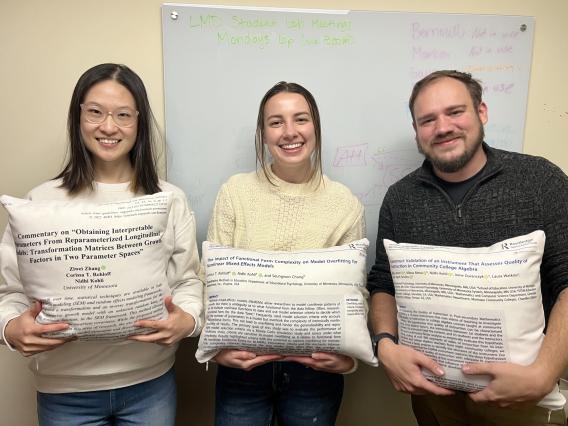Longitudinal Methods Development (LMD) Lab

Members of the LMD lab pose with pillows printed with their first authored papers.

Focus
- Development and refinement of statistical methodologies for analyzing longitudinal data, with a particular focus on nonlinear models.
- Evaluation of model robustness including accuracy, precision, and parameter recovery through Monte Carlo simulation studies.
- Addressing challenges of non-normality, identifiability, and complex estimation in longitudinal models
- Providing researchers and practitioners with both theoretical foundations and empirical guidance for applying these statistical techniques to key substantive questions in education, psychology and broader social sciences.
Current projects
- Bayesian methods for variable selection in nonlinear longitudinal data
- Modeling non-normal random effects and error distributions
- BEND: An R package for Bayesian estimation of nonlinear longitudinal data
Research group

Nidhi Kohli
Lab director
Royal and Virginia Anderson Professor of Quantitative Methods in Education, Department of Educational Psychology

Yue Zhao
Yue is a third-year PhD student in the QME program. Her research focuses on developing and applying longitudinal statistical models to address complex patterns in educational and psychological data. She is particularly interested in extending statistical methods to account for unique data characteristics.
Her first methodological project examined the estimation of non-normal random effects and random errors in nonlinear mixed-effects models using marginal maximum likelihood. Currently, she is working on Bayesian variable selection approaches for nonlinear random effects models. Yue also contributes to an NIH-funded study on bilingual children’s language development, where she applies her expertise in measurement validation and longitudinal modeling.

Scarlett Escudero
Scarlett is a first-year PhD student in the QME program, with a strong interest in psychometric modeling, specifically cognitive diagnosis models (CDMs). She believes in the use of measurement models as tools for educational improvement and promoting equitable access to quality education. She is currently working with both Drs. Wenchao Ma and Nidhi Kohli on the development and extension of CDMs in longitudinal contexts, where diagnostic information can predict and inform future performance through the integration of psychometric and statistical modeling. These models aim to provide diagnostic feedback to teachers and other stakeholders at meaningful points in time. By integrating longitudinal modeling and diagnostic assessment, she seeks to enhance the interpretability and utility of educational data for continuous student growth.
Past PhD students

Ziwei Zhang
Postgrad position: Postdoctoral Researcher at Yale University

Yadira Peralta-Torres
Postgrad position: Assistant professor in the Department of Economics at the Center for Research and Teaching in Economics (CIDE), Mexico

Rik Lamm
Postgrad position: Research, Evaluation, and Assessment Scientist in the Department of Research, Evaluation, and Assessment at the Bloomington Public Schools, MN

Corissa Rohloff
Postgrad position: Research Scientist at the Human Resources Research Organization (HumRRO)
Recent publications
*Zhang, Z., Kohli, N., & Lock, E. F. (in press, 2024). Bayesian (non)linear random effects mediation models: Evaluating the impact of omitting confounders. Psychological Methods. https://doi.org/10.1037/met0000721
*Rohloff, C. T., Kohli, N., & Lock, E. F. (in press, 2024). Identifiability and estimability of Bayesian linear and nonlinear crossed random effects models. British Journal of Mathematical & Statistical Psychology, 77(2), 375–394.
*Peralta, Y., Kohli, N., Kendeou, P., Davison, M. L., & Lock, E. F. (in press, 2023). Modeling the interrelation of reading and mathematics achievement trajectories: Is their development intertwined? Reading and Writing, 37, 1267–1287.
*Zhang, Z., *Rohloff, C. T., & Kohli, N. (2023). Model fit indices for random effects models: Translating model fit ideas from latent growth curve models. Structural Equation Modeling: A Multidisciplinary Journal, 30(5), 822–830.
*Rohloff, C. T., Kohli, N., & Chung, S. (2023). The impact of functional form complexity on model overfitting for nonlinear mixed-effects models. Multivariate Behavioral Research, 58(4), 723–742.
*Zhang, Z., *Rohloff, C. T., & Kohli, N. (2023). Commentary on “Obtaining interpretable parameters from reparameterized longitudinal models: Transformation matrices between growth factors in two parameter-spaces”. Journal of Educational and Behavioral Statistics, 48(2), 262–268.
*Peralta, Y., Kohli, N., Lock, E. F., and Davison, M. L. (2022). Bayesian modeling of associations in bivariate piecewise linear mixed-effects models. Psychological Methods,27(1), 44–64.
Kohli, N., & Sullivan, A. L. (2019). Linear-Linear piecewise growth mixture models with unknown random knots: A primer for School Psychology. Journal of School Psychology, 73, 89–100.
Kohli, N., *Peralta, Y., & *Bose, M. (2019). Piecewise random-effects modeling software programs. Structural Equation Modeling: A Multidisciplinary Journal, 26(1), 156–164.
*Peralta, Y., Kohli, N., & Wang, C. (2018). A primer on distributional assumptions and model linearity in repeated measures data analysis. Quantitative Methods for Psychology, 14(3), 199–217, DOI: doi:10.20982/tqmp.14.3.p199.
Lock, E. F., Kohli, N., & *Bose, M. (2018). Detecting multiple random changepoints in Bayesian piecewise growth mixture models. Psychometrika, 83(3), 733–750.
Kohli, N., *Peralta, Y., *Zopluoglu, C., & Davison, M. L. (2018). A note on estimating single-class piecewise mixed effect models with unknown change points. International Journal of Behavioral Development—Method & Measures Section, 42(5), 518–524.
Harwell, M. R., Kohli, N., & *Peralta, Y. (2018). A survey of reporting practices of computer simulation studies in statistical research. American Statistician, 72(4), 321–327.
Harwell, M. R., Kohli, N., & *Peralta, Y. (2017). Experimental design and data analysis in computer simulation studies in the behavioral sciences. Journal of Modern Applied Statistical Methods, 16(2), 3–28.
Sullivan, A. L., Kohli, N., Farnsworth, E. M., Jones, L., & Sadeh, S. (2017). Longitudinal models of reading achievement of students with and without learning disabilities. School Psychology Quarterly, 32(3), 336–349.
Kohli, N., Harring, J. R., & *Zopluoglu, C. (2016). A finite mixture of nonlinear random coefficient models for continuous repeated measures data. Psychometrika, 81(3), 851–880.
Wang, C., Kohli, N., & *Henn, L. (2016). A second-order longitudinal model for binary outcomes: Item response theory versus factor analytic framework. Structural Equation Modeling: A Multidisciplinary Journal, 23(3), 455–465.
Kohli, N., Hughes, J., Wang, C., *Zopluoglu, C., & Davison, M. L. (2015). Fitting a linear–linear piecewise growth mixture model with unknown knots: A comparison of two common approaches to inference. Psychological Methods, 20(2), 259–275.
Kohli, N., Koran, J., & *Henn, L. (2015). Relationships among classical test theory and item response theory frameworks via factor analytic models. Educational and Psychological Measurement, 75(3), 389–405.
Kohli, N., Sullivan, A. L., Sadeh, S. S., & *Zopluoglu, C. (2015). Longitudinal mathematics development of students with learning disabilities and students without disabilities: A comparison of linear, quadratic, and piecewise mixed effects models. Journal of School Psychology, 53(2), 105–120. [The first author received the following financial support for the research, authorship, and publication of this article: U of M Grant-in-Aid of Research, Artistry & Scholarship Program]
*Zopluoglu, C., Harring, J. R., & Kohli, N. (2014). FitPMM: An R routine to fit finite mixture of piecewise mixed–effect models with unknown random knots. Applied Psychological Measurement, 38(7), 583–584.
Kohli, N., Harring, J. R., & Hancock, G. R. (2013). Piecewise linear–linear latent growth mixture models with unknown knots. Educational and Psychological Measurement, 73(6), 935–955.
Kohli, N., & Harring, J. R. (2013). Modeling growth in latent variables using a piecewise function. Multivariate Behavioral Research, 48(3), 370–397.
*Indicates co-author was an UMN student during part or all of the work